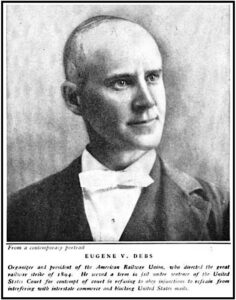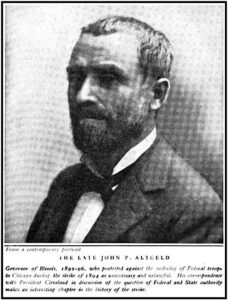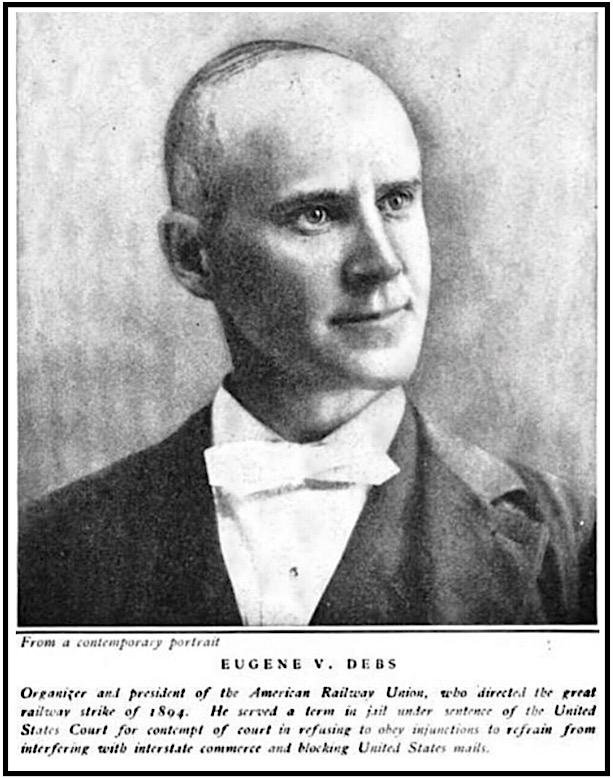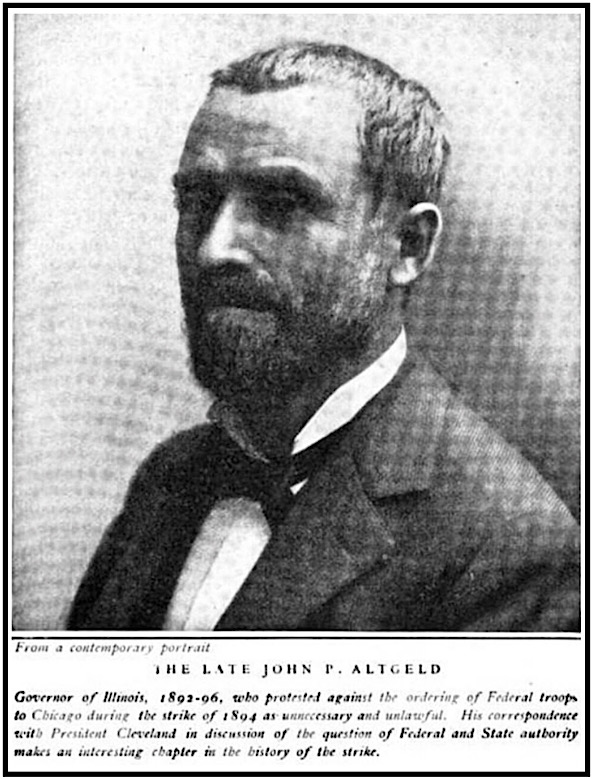 —————
—————
Hellraisers Journal – Wednesday August 31, 1904
Eugene Debs Replies to Grover Cleveland’s Critique of the Chicago Strike of 1894
From the Appeal to Reason of August 27, 1904:
The Federal Government and the Chicago Strike
Eugene V. Debs’ Reply to Grover Cleveland’s Magazine Article.
This article was written for McClure’s Magazine in reply to Cleveland, but the editor of that publication refused to publish it, although permitting Cleveland’s calumny of the railway employes of this country to appear in its columns. McClure boasts of circulating a half million copies of Cleveland’s article. This first edition of the Appeal already reaches the half-million mark-ten days before going to press. It will exceed one million before the first of September. The Socialists of America propose to give plutocracy an example of what can be accomplished in the way of circulating the defense of the working class in spite of the wealth of plutocracy. Every true Socialist will take a hand in this distribution.
IN THE July issue of McClure’s Magazine, ex-President Grover Cleveland has an article on “The Government in the Chicago Strike of 1894.” That there may be no mistake about the meaning of “government” in this connection, it should be understood that Mr. Cleveland has reference to the federal government, of which he was the executive head at the time of the strike in question, and not to the state government of Illinois, or the municipal government of Chicago, both of which were overridden and set at defiance of the executive authority, enforced by the military power of the federal government, under the administration of Mr. Cleveland.
CLEVELAND VINDICATES HIMSELF.
THE ex-president’s article not only triumphantly vindicates his administration, but congratulates its author upon the eminent service he rendered the republic in a critical hour when a labor strike jarred its foundations and threatened its overthrow.
It may be sheer coincidence that Mr. Cleveland’s eulogy upon his patriotic administration, and upon himself as its central and commanding figure, appeared on the eve of a national convention composed largely of his disciples who were urging his fourth nomination for the presidency for the very reasons set forth in the article on the Chicago strike.
HIS KNOWLEDGE SECOND-HAND.
HOWEVER this may be, it is certain that of his own knowledge ex-President Cleveland knows nothing of the strike he discusses; that the evidence upon which he acted officially and upon which he now bases his conclusions was ex parte, obtained wholly from the railroad interests and those who represented or were controlled by these interests, and it is not strange, therefore, that he falls into a series of errors beginning with the cause of the disturbance and running all through his account of it, as may be proved beyond doubt by reference to the “Report on the Chicago Strike” by the “United States Strike Commission,” of his own appointment.
WHAT WAS THE CHICAGO STRIKE?
SIMPLY one of the many battles that have been fought and are yet to be fought in the economic war between capital and labor. Pittsburg, Homestead, Buffalo, Latimer, Pana, Coeur d’Alene, Cripple Creek and Telluride recall a few of the battles fought in this country in the world-wide struggle for industrial emancipation.
When the strike at Chicago occurred, did President Cleveland make a personal investigation? No.
Did he grant both sides a hearing? He did not.
In his fourteen-page magazine article what workingman, or what representative of labor, does he cite in support of his statements or his official acts? Not one.
I aver that he received every particle of his information from the capitalist side, that he was prompted to act by the capitalist side, that his official course was determined wholly, absolutely by and in the interest of the capitalist side, and that no more thought or consideration was given to the other side, the hundreds of thousands of workingmen, whose lives and whose wives and babes were at stake, than if they had been so many swine or sheep that had balked on their way to the shambles.
* * *
THE GREATEST INDUSTRIAL BATTLE IN HISTORY.
The Chicago strike was in many respects the grandest industrial battle in history, and I am prouder of my small share in it than of any other act of my life.
Men, women and children were on the verge of starvation at the “model city” of Pullman. They had produced the fabulous wealth of the Pullman corporation, but they, poor souls, were compelled to suffer the torment of hunger pangs in the very midst of the abundance their labor had created.
A hundred and fifty thousand railroad employes, their fellow members in the American Railway Union, sympathized with them, shared their earnings with them, and after vainly trying in every peaceable way they could conceived to touch the flint heart of the Pullman Company, every overture being resented, every suggestion denied, every proposition spurned with contempt, they determined not to pollute their hands and dishonor their manhood by handling Pullman cars and contributing to the suffering and sorrow of their brethren and their wives and babes. And rather than do this they laid down their tools in a body, sacrificed their situations and submitted to persecution, exile and the blacklist; to idleness and poverty, crusts and rags, and I shall love and honor these moral heroes to my latest breath.
There was more of human sympathy, of the essence of brotherhood, of the spirit of real Christianity, in this act than in all the hollow pretenses and heartless prayers of those disciples of mammon who cried out against it, and this act will shine forth in increasing splendor long after the dollar-worshipers have mingled with the dust of oblivion.
Had the Carpenter of Nazareth been in Chicago at the time he would have been on the side of the poor, the heavy-laden and sore at heart, and he would have denounced their oppressors and been sent to prison for contempt of court under President Cleveland’s administration.
President Cleveland says that we were put down because we had acted in violation of the Sherman anti-trust law of 1890. Will he kindly state what other trusts were proceeded against and what capitalists were sentenced to prison during his administration?
He waited ten years to cast his aspersions upon the honor of John P. Altgeld, and if that patriotic statesman had not fallen in the service of the people, if he were still here to defend his official acts, it is not probable that the ex-president would have ventured to assail him.
A TRIBUTE TO GOVERNOR ALTGELD.
Reluctantly indeed do I close without the space to incorporate his burning messages to President Cleveland, and at least some brief extracts from his masterly speech on “Government by Injunction.”
His memory requires no defense, but if it did I could speak better for him than for myself. He never truckled to corporate wealth, he did not compromise with his conscience, he was steadfast in his devotion to truth and in his fidelity to right, and he sought with all his strength to serve the people, and the people will gratefully remember him as one of the true men, one of the great souls, of his sordid age.
The Chicago strike is not yet settled, and its “concluding pages” are yet to be written.
[Photographs and emphasis added.]
From McClure’s Magazine of July 1904:
Eugene V. Debs [1894]
Organizer and president of the American Railway Union, who directed the great railway strike of 1894. He served a term in jail under sentence of the United States Court for contempt of court in refusing to obey injunctions to refrain from interfering with interstate commerce and blocking United States mails.
The Late John P. Altgeld [1894]
Governor of Illinois, 1892-96, who protested against the ordering of Federal troops to Chicago during the strike of 1894 as unnecessary and unlawful. His correspondence with President Cleveland in discussion of the question of Federal and State authority makes an interesting chapter in the history of the strike.
~~~~~~~~~~~~~~~~~~~~~~~~~
SOURCES
Quote EVD Workers n Parasites, SDH Jan 30, 1904
https://www.marxists.org/history/usa/pubs/social-democratic-herald-us/040130-socdemherald-v06n40w287.pdf
Appeal to Reason
(Girard, Kansas)
-Aug 27, 1904, pages 1+2
(and see page 4: “Ten Years Ago and Today” by Fred Warren)
https://www.marxists.org/history/usa/pubs/appeal-to-reason/040827-appealtoreason-w456-debs.pdf
IMAGES
Debs p228, Altgeld p229, McClure’s of July 1904
https://books.google.com/books?id=PolEAQAAIAAJ
See also:
McClure’s Magazine, Volume 23
S.S. McClure, Limited, 1904
-July 1904
(search with “by Grover Cleveland”) p. 227
https://books.google.com/books?id=PolEAQAAIAAJ
Aug 27, 1904 – AtR p1 – The Federal Government and the Pullman Strike: Eugene V. Debs’ Reply to Grover Cleveland’s Magazine Article
https://www.marxists.org/history/usa/parties/spusa/1904/0707-debs-govandpullman.pdf
Aug 27, 1904 – AtR p1 – Apostrophe to Liberty
https://www.marxists.org/history/usa/parties/spusa/1904/0827-debs-apostrophe.pdf
Hellraisers Journal – Thursday July 25, 1901
Pullman’s Injunction Judge, William Woods, Is Dead
Hellraisers Journal – Thursday April 10, 1902
How Six Months in the Woodstock Jail Made a Socialist of Eugene Debs
Jan 1, 1904 Social Democratic Herald (Milwaukee)
“As to True Brotherhood” EVD to United Brotherhood of Railway Employes
https://www.marxists.org/history/usa/pubs/social-democratic-herald-us/040130-socdemherald-v06n40w287.pdf
Tag: Pullman Strike of 1894
https://weneverforget.org/tag/pullman-strike-of-1894/
~~~~~~~~~~~~~~~~~~~~~~~~~
The Ballad of Eugene Victor Debs – Joe Glazer




